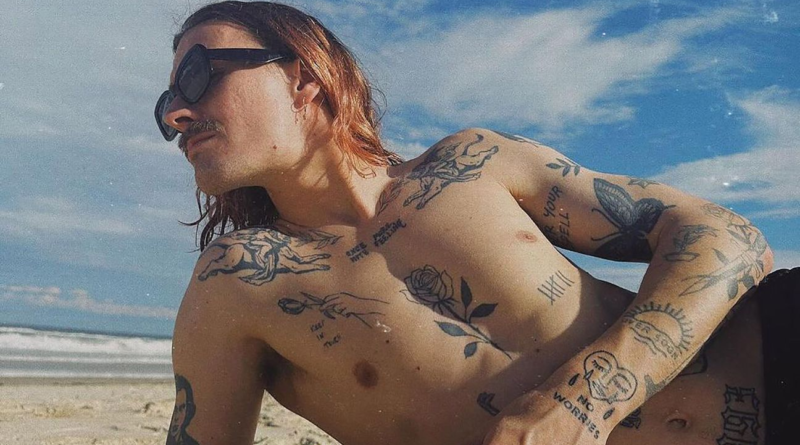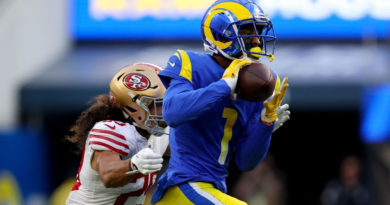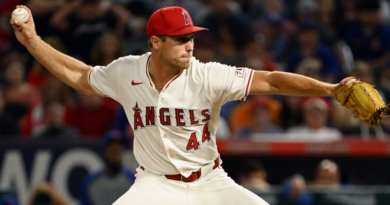Tattoos, retro kits and St. Pauli: Meet Australia's Jackson Irvine, soccer's hipster king
Days before he flies out to represent Australia at the Asian Cup, as he recharges his batteries in the coastal village of Brunswick Heads, Jackson Irvine recalls the first of what would become many tattoos. While in his early 20s, travelling through Copenhagen during an international break and with a bit of time to kill, Irvine figured he might as well go and get some ink.
“I got two at the same time,” he tells ESPN. “I got a little flower on my arm, and I got the Buffy one on my chest: ‘Once More With Feeling.’ The Buffy one is still definitely one of my favourites.”
– Asian Cup: Home | Fixtures | Groups | Team previews
– Stream on ESPN+: LaLiga, Bundesliga, more (U.S.)
If you’re at all familiar with the cult classic TV series “Buffy the Vampire Slayer” then you’re probably familiar with the “Once More With Feeling” episode, even if you didn’t know that’s what it’s called. It’s one of the show’s most famous and consequential: the musical episode in which the characters intermittently break out into song to express previously hidden, inner truths. Irvine is such a fan of the episode that he owns a copy of the episode’s soundtrack. On vinyl, naturally.
A tribute to this episode, in particular, makes for a rather effective tattoo. Not only does it allow the Socceroos midfielder to pay tribute to something that he appreciates but tattoos also, in their way, provide something of a window into their owners’ character and individuality without needing to say a word — an inner truth on display through ink on skin.
And while “Once More With Feeling” and a flower may have been Irvine’s first, they weren’t anywhere close to his last; his frame these days is a patchwork of tattoos that range in style from more traditional fare to odes to TV show “Twin Peaks,” rapper MF DOOM, singer Lou Reed, the Simpsons’ Moe Szyslak, and more.
“I just recently got a new one on my hand, kind of in a classic traditional style of a crying love heart and it says ‘No worries’ underneath,” Irvine says. “And I would say that’s probably just because it’s my newest, that’s my favourite at the moment.
Jackson Irvine rocking up to Socceroos camp in Qatar in the retro Mark Viduka kit 🥵
Unrivalled drip from the coolest man in the world 💧
📷 @Socceroos #OptusSport pic.twitter.com/Qa0gOoR9MG
— Optus Sport (@OptusSport) November 14, 2022
“But I love all my pop culture references and everything like that. And they’re the ones that I think people connect to the most as well because they get a little bit more of me in that. When they see ‘The Simpsons’ or Buffy, or ‘Seinfeld,’ or ‘Twin Peaks’ or anything like that, that I’ve got somewhere tatted on me. I think people recognise that there’s a little bit more of me in there as well. So I enjoy them all.”
In case you haven’t guessed it already, Irvine is a pretty cool character. You don’t need to be André 3000 to figure that one out. Take a gander at his Instagram account — which he says is made exponentially better by his partner’s photography skills — and you’ll see not just shots of him in action with St. Pauli and the Socceroos but also windows into fashion, culture and lifestyle carefully curated to not only create a great feed but also to be authentically representative of him as an individual.
One of the pre-eminent themes among these images is a reflection of football not just representing a profession to Irvine, but a part of his story; it’s something that has shaped him into the person he is and now serves as a medium through which he shares himself with others.
The son of a professional footballer, Steve, who emigrated from Scotland to play in the Victorian state leagues in the 1970s, as well as the nephew of Scottish immigrant and Australia international Sandy, Irvine grew up in a footballing household in Melbourne’s southeast.
Not finding those of a similar passion at school in a city where AFL and cricket reign supreme, he connected to the game both on and off the field at his local clubs: Ringwood City, Knox City, Frankston Pines.
“Football was everything I remember,” he says. “Part of my childhood in that sense.”
One of the most obvious manifestations of this growing football obsession came in the form of a fascination with kits, something that has remained with him. These days, the Socceroos star has the resources and profile to acquire all manner of rare and notable jerseys — he recently arriving at a national team camp in one of Australian kit collectors’ holy grails, a 1996 Olyroos kit. Back then, though, he didn’t quite have the same level of reach, with much of his soccer shirt collection coming from the “fakies” he could find in Melbourne at the now-closed Caribbean Market in Rowville or Dandenong Market.
“I was always obsessed, it was all I used to wear,” Irvine says with a laugh. “I remember one time when I was about 14 or 15, embarrassingly, I got invited to a school party or something like that. I went to go and my mum was just like, we need to take you shopping to just get real clothes because all you wear is football kits. We can’t send you out into the world as a teenager just wearing football tops.
“I’ve just always loved what they’ve represented and even more so as I’ve gotten older. The nostalgia and that connection to that time, a certain player or a certain tournament that brings when you see a certain design or something along those lines. It resonates really, truly with me.”
Departing Australia as a teenager to pursue his professional career, Irvine began with stints across Scotland and England, going from an Australian environment for which football existed on the periphery to places where clubs existed not just as sporting entities but as central pillars of entire cities. This reached something of a zenith in 2021 when he moved to St. Pauli, the Hamburg-based club who are world-renowned for their supporter-driven embrace of social justice and progressive politics.
Jackson #Irvine got on the scoresheet for the second league game running on Saturday. 🗒⚽️
pic.twitter.com/HTIYlo39wk#fcsp #osnfcsp | Presented by @LichtBlick_de— FC St. Pauli English (@fcstpauli_EN) December 12, 2023
“You can see the connection that it brings with people,” he says. “The way that people look to their football club to be the centre point of a community. You can’t take that for granted as a footballer, and for myself, as I’ve gotten older, you appreciate what that means to fans and players and everybody who’s involved in the game.”
But just as much as community shapes football, Irvine is part of a growing generation of footballers becoming increasingly adept at recognising the power that football has to shape the world around it and using their platforms to try and do so. On matters such as climate change, Indigenous rights and reconciliation in Australia, equitable treatment for men’s and women’s footballers, worker and LGBTQIA+ rights in Qatar, and more besides, Irvine has spoken. Irvine knows that he can’t present perfect solutions, but he believes that trying imperfectly is always preferable to doing nothing. Not just because he’s a footballer, but because he believes in these things’ importance.
St. Pauli captain Jackson #Irvine presented the trophies at the #StartschussMasters, one of Germany’s biggest tournaments for queer footballers, on Saturday. The competition was won by PAN Fodbold from Copenhagen. 🏆🌈#fcsp pic.twitter.com/mu3MSrKkIY
— FC St. Pauli English (@fcstpauli_EN) November 6, 2023
“People ask me about St. Pauli in particular when it comes to this topic,” he says. “Have I become more of that person since I came to the club? Or am I at the club, because I’ve always kind of been this person? I think it is a bit of both.
“The support I have allows me to maybe be more vocal in the things that I care about, the things I believe in. The things that I hope that all people should feel are important and maybe are not aware of or maybe not exposed to in a certain way.
“I don’t think of myself as someone who shapes football culture or has a role of that kind of importance. But the voice that you do have is just the main thing, especially when it comes to topics that shape our world and are not just football-related.
“I guess it’s just when you care deeply about things, you want to try and make any sort of change, whether that’s through making people who are unaware of a situation aware, or actively trying to make that change through working with organisations or doing things more proactively.
“It’s a tough world to navigate, especially as someone in our environment, you don’t want to alienate sections of your audience, your fan base, or the community or country. But at the end of the day, if you feel strongly about it and you see an injustice that you want to try and shed a light on or share a voice for, then I think it’s important that you do that.”




